Reporters / Nien Lee, Wenchi Chou, Yingya Jian
Taiwan has had strict border controls ever since the outbreak of Covid-19 in 2020, which led to travel restrictions making overseas travel almost impossible. The tourism industry was one of the first industries to face the devastating impact of the pandemic. According to statistics released by the Taiwan Tourism Bureau, more than 168 travel agencies had been shut down in 2020 and 2021, and over 10 thousand employees were laid off.
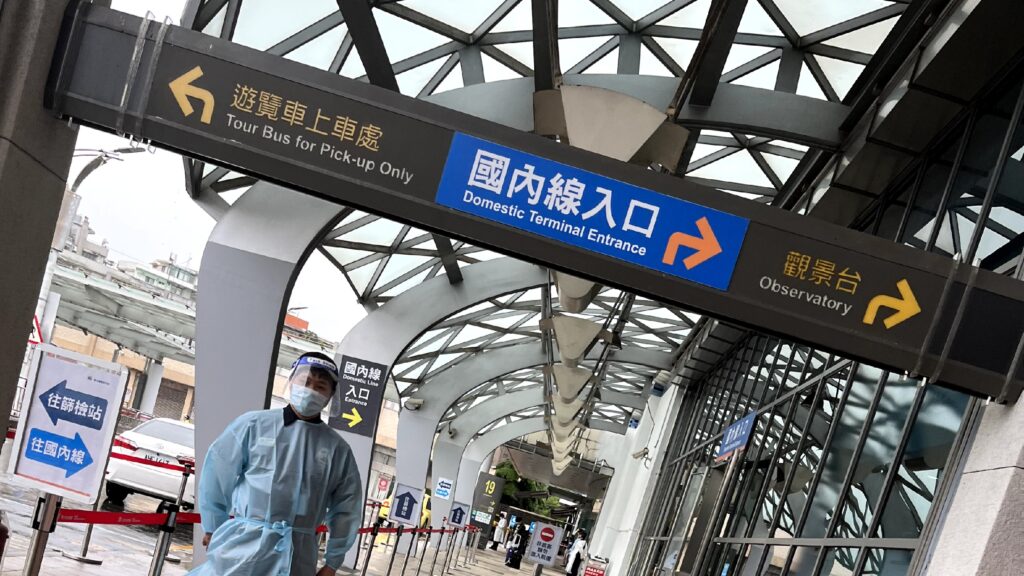
With no customers traveling abroad and no inbound tourists, it seems that domestic traveling is the only option left for the remaining agencies to survive. However, with over 4,000 of them on an island of merely 338,008 square kilometers and a population of 23 million, the competition is indeed intense. Targeting the domestic tourists might not be enough for these travel agencies, so what else could they do to survive these unprecedented times?
Status quo of travel industry in Taiwan
Travel agencies across Taiwan have had no other choice but to lay off employees during the pandemic. Jack Zeng, CEO of Great Star Travel, said that his company has had a deficit of nearly NT$30 million in the past two years; and there would have been a greater amount of loss if it wasn’t for the business center they were also running. Zhi-Ting Zang, former director of Overseas Business of South East Travel, pointed out, “Since the outbreak of the pandemic, there has been few outbound traveling tourists with most of them traveling for business.”

Employees who were once responsible for overseas traveling, visa application assistance, and hotel bookings, have shifted to domestic traveling, which is also saturated, thus leaving many of them unemployed. People in the industry have to pick up a side job or even switch careers. Travel agencies had to cut down expenses by closing down physical storefronts, and even start new businesses to prevent further losses. Since the pandemic, the Taiwanese government has announced a policy to forbid outbound tours. Jamie Lee, who is a professional tour guide with outbound travel experience for over a decade, said that although she has been receiving financial aid from the government, with an extreme drop in earnings due to absolutely no opportunities for tours, the situation is beyond dreadful.
According to statistics released by Taiwan Tourism Bureau, numbers of outbound traveling tourists had seen significant growth annually before the pandemic, with a peak of 17 million in 2019. However, in 2020, when the pandemic hit, there were only 2.3 million left. As for inbound tourists, the numbers were up to 12 million in 2019 but then dropped to 140 thousand in 2021.
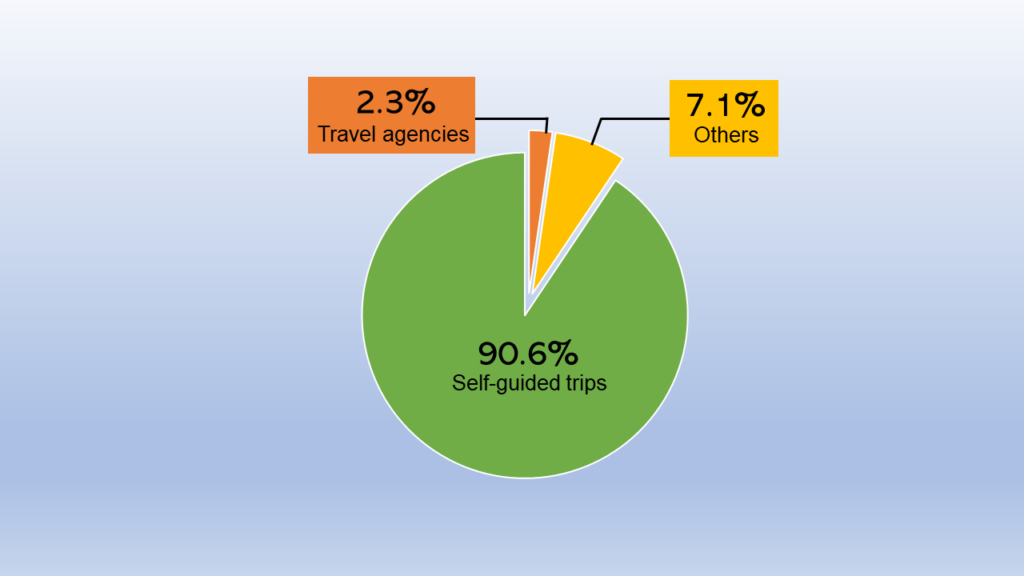
According to a survey conducted by the Taiwan Tourism Bureau with over 25 thousand respondents, the current domestic tourism in Taiwan consists of mostly self-guided trips, which run up to 90% of all respondents, and only 2.3% of them travel with package deals from travel agencies. This has posed a great threat to the local tourism industry.
During the peak of the pandemic with Level 3 restrictions, the Taiwanese government announced relief packages such as education and training for different professions and financial aids. When the pandemic subsided, stimulus vouchers were issued, and domestic tourism subsidy programs were likewise launched. These measures were taken in hope of rebuilding tourism in Taiwan; yet sadly speaking, they brought only temporary relief. Facing the shrinking market, travel agencies have no choice but to come up with more measures to keep their companies solvent, ranging from reducing expenses by cutting staff and renting out offices to increasing profits by selling products alongside travel and developing alternative tourism that combines tourist products or individual tourist services. It involves traveling to relatively remote natural areas to admire the beauty of natural sceneries. This kind of tourism has often been epitomized by drifters or adventurers.
Dilemma before pandemic and lethal strike by pandemic
According to Zeng, enterprise transformations actually existed way before the pandemic. This also means that the industry has already encountered some deep-rooted problems. In fact, one of the difficulties the industry has been facing is the excessive number of travel agencies that results in fierce competitions.
“Profits of selling plane tickets are very low, so I have been thinking of trying different ways to make a profit,” Zeng said. His company mainly handles plane tickets for business travels and has struggled with customer attrition or defection. “There are a lot of travel agencies in Taiwan, and small businesses are no match for bigger ones. Special services such as customized tours are seen everywhere, so it is a big challenge for us to make a breakthrough,” Zeng pointed out.
Nowadays, sufficient information can be found on the internet, which makes trip-planning by travelers themselves effortless. Moreover, plane tickets and hotel accommodations can be booked easily on the internet, thus, more and more people choose to travel without consulting a travel agent. All of these factors bear direct impacts on traditional travel agencies.
Just as the travel agencies were struggling with the possibilities of transformation, they hit rock bottom when the pandemic struck. Employees had no choice but to deliver food or work as Uber drivers as side jobs to make ends meet. Some agencies even started running group buying platforms for daily necessities and groceries. But since the tourism industry is a franchising business, developing business other than the stipulated categories could be illegal, which adds another obstacle to the list.
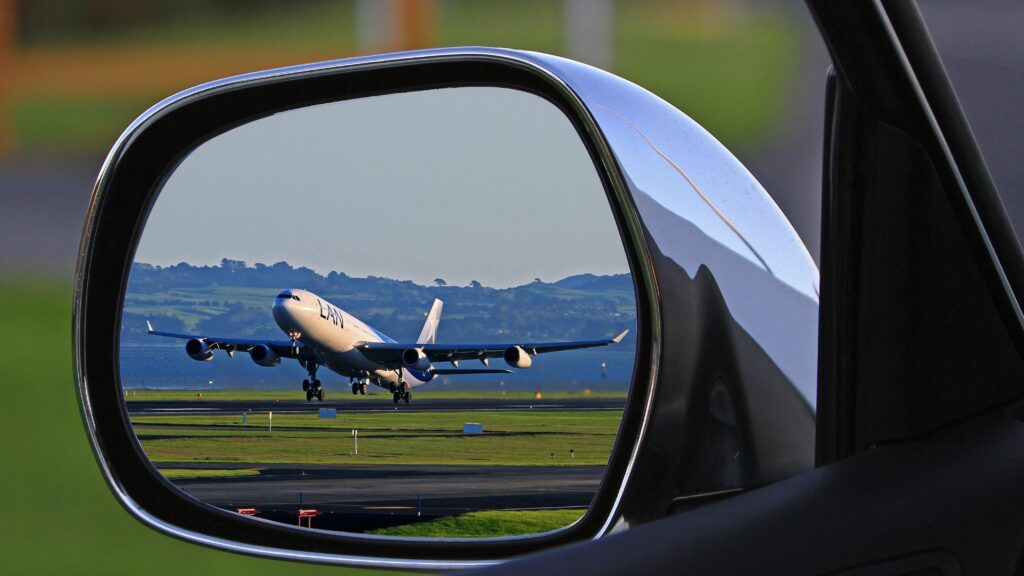
Progress during post-pandemic era
Taiwan is currently undergoing a widespread of the Omicron variant, yet despite this, measures are being adjusted and government health officials have announced that they are aiming for coexistence with the coronavirus. Mandatory quarantine for arriving passengers was shortened from 14 to 10 days, and now to 7 days. As most countries around the world have removed travel restrictions and public health and social measures, the travel industry in Taiwan yearned for adjustments of the restrictions in the country. According to a news report from CNA, several travel business associations in Taiwan have formally stated that they hope the Center for Disease Control would take action to ease travel bans soon, proposing the “357” plan, which aims for removing quarantine measures for fully-vaccinated business entries in March, regular entries in May, and a full ban repeal by July of 2022.
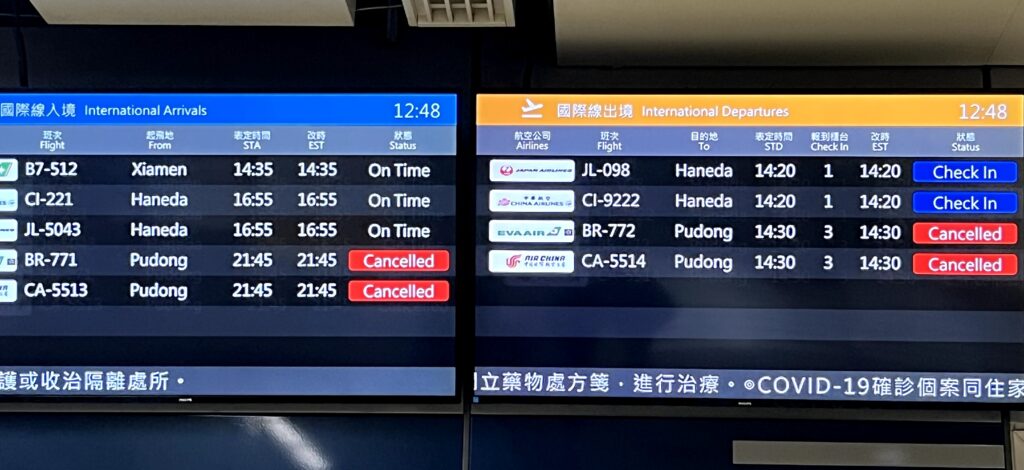
Preparations before traveling abroad are often complicated and time-consuming as different travel restrictions are imposed in different regions, which leads to a greater need for packaged services or arranged travel by travel agencies. The travel industry indicated that travel costs have risen since the post-pandemic era, yet there are still many people willing to pay for traveling.
A survey of 4,000 samples from Xinmedia in 2021, which could probably predict where the industry is heading in 2022 and later on, shows a strong desire among respondents in traveling abroad. As a matter of fact, there are nearly 80% of the respondents hoping to be able to travel abroad at least once in 2022. Accordingly, it is highly possible that there would be a rush of “revenge travel” among Taiwanese once the pandemic subsides. Therefore, preparations prior to traveling such as PCR test arrangements, vaccination passport application, and quarantine hotel arrangements are considered to be added as services provided by the travel agencies.
According to the Traveling and Tourism Tendency Report of 2022 by Xinmedia, 62.8% of the respondents would require services of applying for a vaccination passport from travel agencies, 44.2% of them would call for quarantine hotel arrangements, and 41% of them hope that travel agents would provide them with services for arranging PCR testing. People have gotten used to the norm of health and social measures, which will likely still be around for a while due to the continuous spread of coronavirus. Yet this might be another chance for the travel agencies to attract customers by providing them with extra services other than their usual booking and tour arrangements.
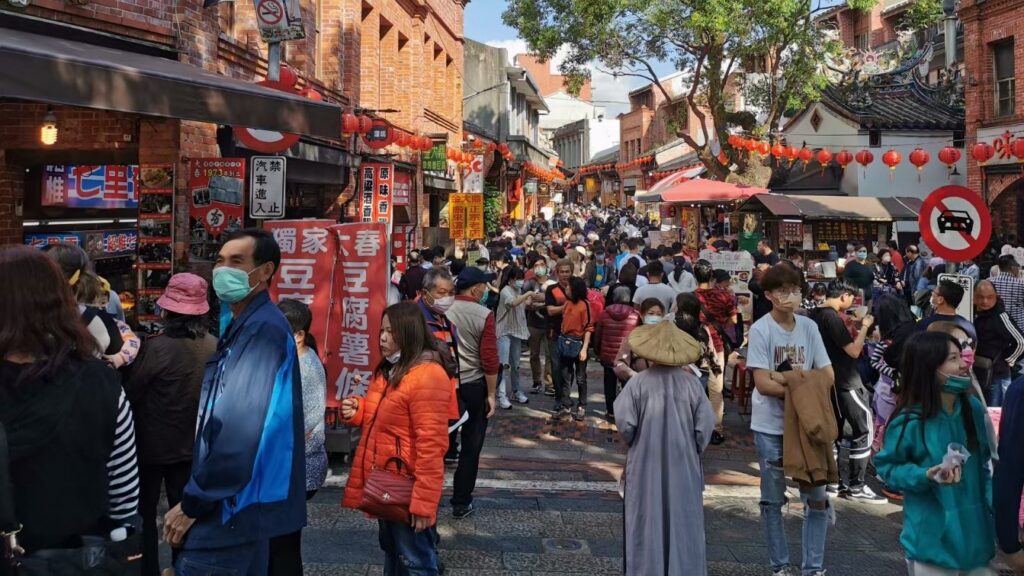
Agencies tend to juggle with all possible sidelines, figuring out any opportunities to make profit. Everyone in the industry are looking forward to leading a normal life they once had. Although it is expected that outbound traveling will be on track once travel restrictions are loosen, as many Taiwanese enjoy traveling abroad to countries in Europe and the United States, which have mostly eliminated pandemic restrictions. Yet some people from the industry made presumptions that it would take up to at least two years -until 2024- for the local tourism industry to fully get back on the horse.

